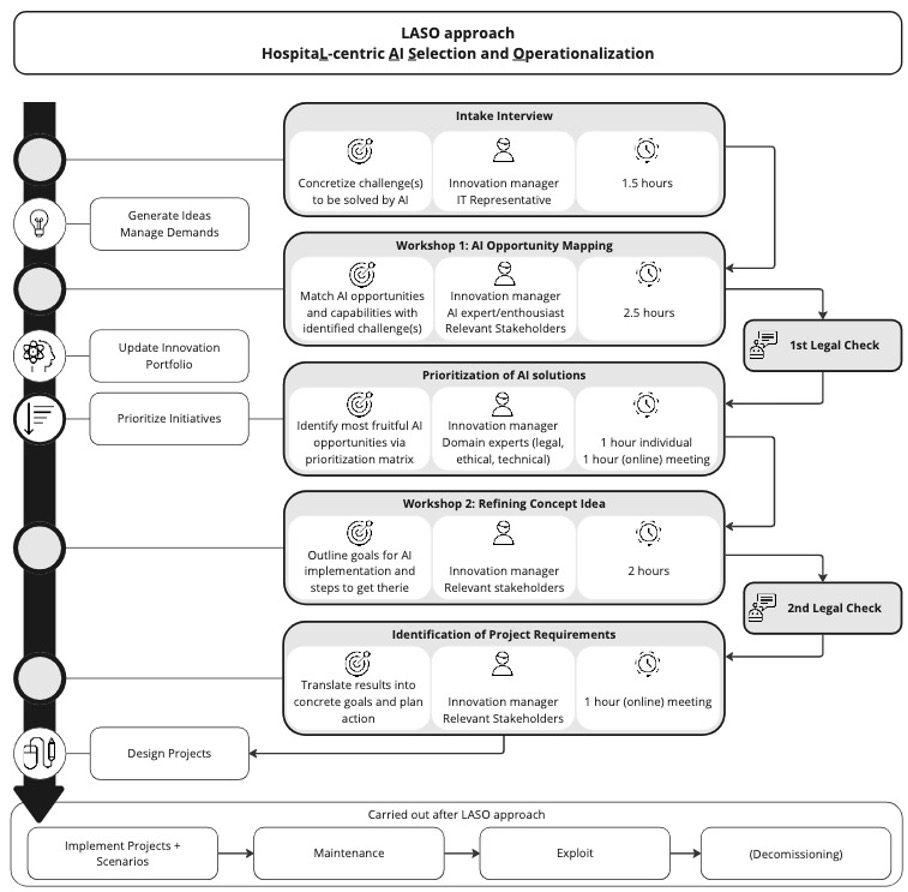The FARI Conference returns on 17 and 18 November in Brussels, find out more.
An Initiative of
Supported by

LASO: HospitaL-centric AI Selection and Operationalization blueprint approach
DEC 2024
LASO: HospitaL-centric AI Selection and Operationalization blueprint approach
Context
The LASO project aims to harness the potential of AI-driven solutions to improve the common good within healthcare. Current AI applications in healthcare are capable of processing complex data and delivering consistent, precise outcomes at scale. In hospitals, where resources such as qualified personnel are limited, AI presents an opportunity to enhance patient care by reducing administrative burdens, speeding up processes, and cutting costs. However, AI implementation in the clinical practice of hospitals remains limited. Decision-makers such as CEOs, CTOs, and innovation managers often struggle to identify feasible AI use cases, missing opportunities for solutions that could serve the common good. Many AI-initiatives remain technology-driven, top-down approaches, which increase the risk of failure at the implementation stage. Moreover, research departments and AI providers tend to offer solutions without considering the societal impacts or benefits for hospitals, patients and employees. Addressing these challenges requires a multidisciplinary approach to the design and implementation of AI-driven solutions in healthcare.
The LASO project (HospitaL-centric AI Selection and Operationalization blueprint approach)
The LASO project focuses on creating a comprehensive methodology to support AI-driven innovation in hospitals, with an emphasis on the common good. The project’s core mission is to integrate existing frameworks and tools to create tailored AI-solutions that are trustworthy, robust, and ethically responsible. The goal is to “de-risk” the innovation process by providing a systematic blueprint prior to acquiring, developing and implementing AI-based solutions. The key objectives of the LASO project are to:
Map and compare existing tools and frameworks for AI implementation and innovation
Co-create a systematic methodology and supporting materials to identify and map current hospital processes in need of AI solutions. This includes envisioning AI-driven approaches that are both demand-driven and focused on the common good, while also being technically feasible within the current state of AI development.
Test and validate this methodology through practical use cases within hospital settings
Expected results
The anticipated outcome of the LASO project is a systematic approach for de-risking AI innovations. This approach will assist in identifying AI opportunities and selecting relevant use cases that align with the common good in healthcare settings. To ensure broad applicability, training materials and supporting guidelines will be co-created by a diverse group of researchers, industry experts and hospital stakeholders. These tools will provide a blueprint for designing, developing, and integrating AI innovations in hospitals.

Partners of the project
UZBrussel: The Universitair Ziekenhuis Brussel (UZBrussel) is a university hospital offering a full range of high-quality health services at regional, national and international level, ranging from basic medical care to highly innovative cutting-edge technologies. In LASO, UZBrussel will share its experience for implementing and using AI-solutions in everyday practice by actively participating in preliminary workshops. Additionally, UZBrussel will use its network within the Brussels hospital context to create a user group for further ojecctification and validation of the LASO methodology.
iCite (ULB): The International Centre for Innovation, Technology and Education studies at the Université Libre de Bruxelles (ULB) aims to foster excellence in research and high-quality education in management by gaining a better understanding of the drivers of innovation and wellfare within our society. In the LASO project, iCite will perform a comprehensive review of the current state of the art with regards to innovation management and tools to manage innovation processes. Based on these findings, tools, methods, and guidelines will be tailored to the specific case of AI innovation within the healthcare sector.
Centre Perelman (ULB): As a research center of the law faculty at the Université Libre de Bruxelles (ULB), the Centre Perelman focuses on the interaction between law and digital technologies, including data and AI regulations. Within LASO, Centre Perelman will map current regulation for the health sector to develop a legal risk assessment methodology allowing non-legal stakeholders to perform a legal risk assessment in an oprational context.
Imec-SMIT, Vrije Universiteit Brussel: Research group SMIT (Studies in Media, Innovation and Technology), established at the Vrije Universiteit Brussel (VUB), is specialized in fundamental, applied and project-based social research on media and ICT with an emphasis on innovation, policy and socio-economic questions. In LASO, SMIT will share its expertise and knowledge on the design, implementation, and evaluation of innovative digital health solutions. Given the specific focus on AI-based solutions, SMIT will apply its expert knowledge on AI ethics and social impact and extend it to the specific hospital and healthcare context, to co-create a pragmatic, but scientifically sound, AI blueprint methodology.
Sagacify: Sagacify is dedicated to helping companies optimize their processes by developing tailor-made AI solutions and offering new methodologies to help clients identify opportunities for AI implementation. Within the LASO project, Sagacify will share its technical knowhow and AI project identification methodology to identify AI potential within the hospital.
Share
Other projects